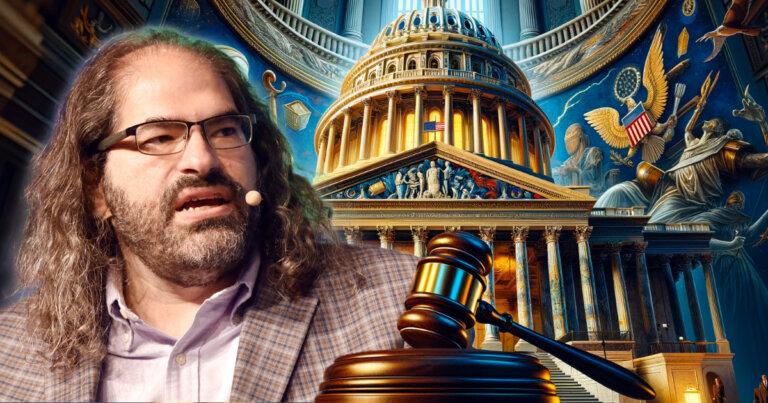 Ripple CTO David Schwartz calls for legislative action to clarify crypto regulations
Ripple CTO David Schwartz calls for legislative action to clarify crypto regulations Ripple CTO David Schwartz calls for legislative action to clarify crypto regulations
Schwartz said that courts alone cannot create a balanced approach to regulating digital assets without legislative input from Congress.

Cover art/illustration via CryptoSlate. Image includes combined content which may include AI-generated content.
David Schwartz, CTO of Ripple, recently shared his thoughts on the changing dynamics of U.S. securities law. Specifically, he addressed its application to digital assets and underscored the necessity for legislative clarity to pave the way for balanced regulation.
Schwartz underscored the flexible nature of the Howey test, which serves as a cornerstone for securities laws. He stressed that its application calls for a nuanced approach rather than a “robotic” one. While he conceded that various court decisions have expanded its interpretation over the years, Schwartz insisted there is still confusion about its application in some cases.
Congressional action
Schwartz’s commentary reflects a growing consensus that the digital asset space may require a fresh legislative perspective to ensure fair and effective regulation.
In his series of tweets, Schwartz provided a nuanced view of the current legal landscape for digital assets and highlighted the need for a balanced approach, possibly through congressional involvement. He expressed skepticism that courts alone could strike an appropriate balance in defining what constitutes security in the context of digital tokens.
He hinted that without legislative action, courts might not classify digital tokens as securities. In such a scenario, a congressional response becomes more likely and would be needed for a more balanced approach to regulation, according to Schwartz.
Securities laws
Schwartz’s comments are rooted in the ongoing debate around the application of the Howey test, which is used to determine whether certain transactions qualify as investment contracts and, thus, are subject to securities laws.
Schwartz asserted that the primary objective of securities laws is to counter securities fraud, which often presents significant detection challenges. He discussed how these laws tackle unique difficulties related to uncovering and penalizing fraud in the securities sector, for example, by mandating disclosure requirements on organizations that seek public investment.
Schwartz noted that while the original Howey test required profits to come “solely” from the efforts of others, subsequent cases have broadened this understanding, acknowledging the influence of market forces. He highlighted that the complexity of defining an investment contract further increases when considering instances where items, given at no cost, are regarded as potential investment contracts.
The Howey test is codified in SEC v. W.J. Howey Co., 328 U.S. 293 (1946), which reads:
“The test is whether the scheme involves an investment of money in a common enterprise with profits to come solely from the efforts of others. If that test be satisfied, it is immaterial whether the enterprise is speculative or nonspeculative, or whether there is a sale of property with or without intrinsic value (See SEC v. Joiner Corp., supra, 320 U. S. 352.) The statutory policy of affording broad protection to investors is not to be thwarted by unrealistic and irrelevant formulae.”
Schwartz, however, argued that for something to be deemed an investment contract, there must be an actual contractual agreement with the potential for defrauding the investor. He also pondered why certain items, like early works of art or collectibles, are not considered securities despite seemingly meeting the criteria set by the Howey test.
However, SEC v. Howey also cites the prevalence of “blue sky” laws in many states as its precedent, complicating Schwartz’s position. According to the Court’s reasoning in constructing the Howey test:
“The term ‘investment contractl is undefined by the Securities Act or by relevant legislative reports. But the term was common in many state ‘blue sky’ laws in existence prior to the adoption of the federal statute, and, although the term was also undefined by the state laws, it had been broadly construed by state courts so as to afford the investing public a full measure of protection. Form was disregarded for substance, and emphasis was placed upon economic reality. An investment contract thus came to mean a contract or scheme for ‘the placing of capital or laying out of money in a way intended to secure income or profit from its employment.'”
In July, a U.S. court ruled that Ripple’s programmatic sales and distributions of XRP are not securities. The court found that these distributions and sales did not meet the Howey Test criteria. However, XRP sales to institutional buyers could be considered securities due to their understanding of the link between XRP’s price and Ripple’s performance.




 Arkham Intelligence
Arkham Intelligence 

 Farside Investors
Farside Investors 
 CryptoQuant
CryptoQuant 
 CoinGlass
CoinGlass 







































































































